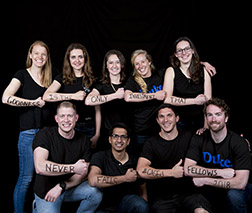
June 2020
If Hannah Ford, Duke MBA class of 2018, had to describe the Center for the Advancement of Social Entrepreneurship (CASE) Fellowship program in one word, she would say it is community. In fact, from building skills in fellow-led design thinking workshops at Fuqua to participating in a virtual book club with her cohort years after graduation, Ford believes that the depth of community she created in the CASE Fellows program was one of the most treasured aspects of her time at business school.
“One of the most valuable aspects of the CASE Fellowship program was community building – while the fellows curriculum exposes you to the skills required of social impact leaders, the fellowship also provides you with a lifelong network of individuals passionate about the intersection of business and social good,” said Ford, who now works as Manager of Strategic Initiatives and Planning for Arts and Cultural Heritage at The Andrew W. Mellon Foundation.
Consistently rated by graduating students as one of the most transformational experiences that they had at Fuqua, the CASE Fellowship program brings together group of second year MBAs to collaboratively take a deep dive into CASE’s critical social impact competencies through a year of cohort-led learning, activities and reflection. Spanning everything from cultivating mindfulness, building skills in root cause analysis and discussing issues in the education system, the CASE Fellowship program provides a space for participants to connect with like-minded individuals from many different backgrounds to further grow their mindsets, skills, and habits.
“I feel that the CASE Fellowship program was valuable because it provided us with the opportunity to learn softer, relational skills and prepare us for the real-world in a way that complemented the hard, analytical skills I was learning in the MBA program,” said Manuel Costa, Duke MBA class of 2018 and CASE Fellow in Ford’s cohort. “Additionally, the members of the community became friends who provided continued support as we all transitioned from Fuqua into our next steps.”
Today, Costa is not only using those learnings to help him build relationships and have complex conversations as Executive Staff for Self-Help Credit Union, but still regularly stays in touch with his cohort, most recently to talk about some of the social impact implications of current events, including the pandemic and the protests for racial equality.
Similar to the CASE Fellowship program, the CASE Initiative in Impact Investing (CASE i3) Fellowship program is also comprised of a group of second year MBA students who thrive on community. However, while the CASE Fellowship program focuses on multiple social impact competencies, the CASE i3 Fellowship program works with students to specifically deepen their knowledge of the impact investing sector through coursework, support of CASE i3’s research and operations and leading a CASE i3 consulting project. Through the CASE i3 Fellowship program, students also gain access to CASE’s impact investing network, which is one of the most credible in the field.
“I felt that the CASE i3 Fellowship experience provided me with a good foundation to understand the sector and gave me the skillsets I needed to set me up for success,” said Sidney McLaurin, Duke MBA class of 2017 and CASE i3 Fellowship co-chair. “Additionally, I gained a strong network within impact investing and found a group of like-minded people that has broadened my professional network and community.”
Attending the Social Capital Markets (SOCAP) convening in San Francisco via the CASE i3 Fellowship provided McLaurin with a specific, valuable addition to his business school experience. He said, “At SOCAP, I not only got to see how well-regarded CASE was in the impact investing space, but I also got to see how much I learned and felt confident with my ability to bring value to this growing field and community.” Now, as a Partner at Material Impact, McLaurin uses what he learned and applies it to defining the future of investing by aiming to have companies that generate high shareholder returns while also making a big difference.
As CASE looks ahead to the fall semester of 2020 and the changes that COVID-19 may bring, one thing that will not change is that sense of community cultivated by the CASE and CASE i3 Fellowships that motivates learning, skills building and growth long beyond when the programs end. Whether through hosting virtual dinners to celebrate the semester’s end or virtually advising individual fellows as they identify next steps in their career, CASE staff will continue to teach, challenge and support fellows through these transformational programs. As Samantha Robinson, a recent 2020 Duke MBA graduate and a CASE Fellow said, “It was the best community to be a part of,” and we here at CASE plan to keep it that way.

